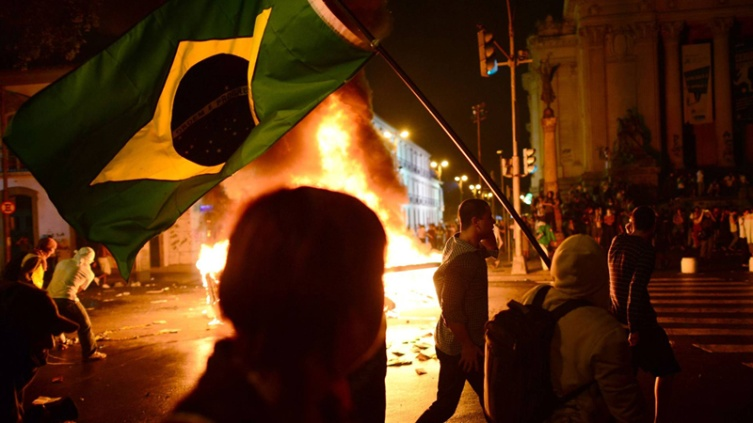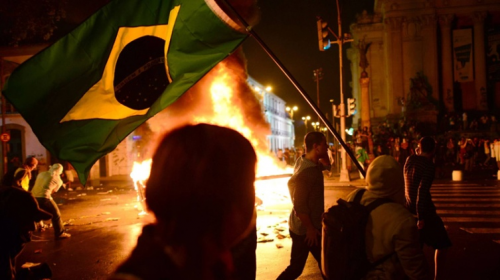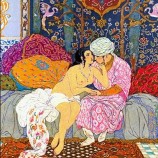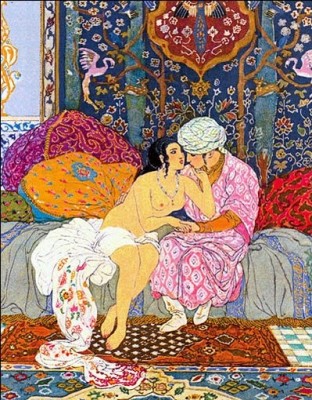The Vandals were a people who inhabited ancient Germania and invaded the Italian Peninsula and North Africa in the fifth century. The word was later given the dictionary definition: To willfully or maliciously deface or destroy (public or private property). To practice, frequently in groups, destructive and violent acts that result in the damage and loss of possessions or property.
Within the current mass demonstrations in demand of social changes such as improvements in public transportation, better health and educational services, there are groups taking advantage of the anonymity that the crowd provides to practice destructive acts, from which no positive results can ever be achieved. The near certainty of impunity, or at least the protective mantle of the crowd, allows some individuals to indulge in morbid and antisocial pleasures born of hatred and frustration; to destroy, burn, and loot. Based in the just demand for a social system that is more efficient and responsive to the needs of the majority of the population less favored by economic resources, these individuals take advantage of the mask of noble and true claims to feel, at moments, strong, indomitable, and powerful vigilantes. It is their moment of glory. Wearing masks most of the time, they can achieve, if they are lucky, the secret pleasure of seeing themselves on camera and published on the news screen or memorialized in photographs. No one will know who they are, they alone will. Maybe they will cut out the photo they appear in to keep as a token of the day they were famous, deliberated and feared by millions of people.
Anyone can easily understand how much easier it is to destroy than to build; how it is easier to steal and plunder than it is to generate means for the acquisition of consumer goods. It is easier to attain the glory of being a terrorist, a rapist, a criminal, than the glory of being a benefactor acclaimed in the media, or even someone famous for their beauty, talent and achievements.
Beyond these points, there is a singular pleasure found in being part of a collective movement, part of a group. We can easily observe certain people who, when alone, are shy and well behaved, but while in a group among their peers, are uninhibited, bold, and daring. Being part of a group expands one’s sense of self, of individuality. I become part of something bigger and the achievements of this group become mine. If my team wins, I also win. If my religion has millions of fans, it is proof that I am right. If I cannot feel valued, recognized, acclaimed or even feared, admired, respected as an individual, being part of a group can get me what I desire. What I cannot get alone, together we shall succeed.
The police can arrest a group of ten bandits, street punks or protestors. They are easy to fence in, apprehend and incarcerate. But how do I do this with ten thousand? And there also lies, in the “vandal” the joy of seeing the impotence of the police force. In a way the crowd protects these isolated groups that exert feelings of vengeance, the glory and pleasure of public transgression while at the same time free of punishment.
There is a satisfaction people find in anger, and this is manifest in their actions. The person who yells, breaks, burns, kills, rapes, offends or just express his feelings, accuses others for what they did wrong and unjust, attains the pleasure of self-expression, attempting to impose and to aggrandize himself. Anger can be righteous or absurd, the means of applying it may be correct or cruel, but it seeks the satisfaction of self-expression. When this is done in a group, this pleasure is immense and expansive, according to the size of the group.
We all know the satisfaction of self-expression. When frustrated, we are all liable to unload anger at times in destructive or unfair ways, whether it is by breaking objects, by exceedingly offending whoever has offended us or even discharging our frustrations onto completely innocent people. It is not difficult to perceive our humanity even in acts of “vandalism”.
There are individuals and groups within society who perform deeds based in what most of us experience only in desires and feelings, or in smaller short range destructive acts. The human shadow, of which we are all members, to a greater or lesser degree, is fully expressed in certain individuals or groups. In large mass movements, such as demonstrations with thousands of people, revolutions, wars, the low probability of punishment unleashes impulses once dormant, but guarded by fear.
We are responsible for all of our actions. None of our past suffering, no injustice committed against us, no painful frustration due to our limitations and disabilities gives us the authority to destroy living things, people, or cause harm to innocent people. Each and every one of us is responding or will respond, sooner or later, before himself or others, for everything he has done in his life.
We can all seek ways of creating constructive achievements which give us the pleasure of self-expression, the pleasure of being part of a group, the joy of being recognized and valued.
I conclude by quoting here the last paragraph of another one of my previous articles available on this same site:
Depression and delinquency
‘There is life in us. Something in us wants to live, to fall in love with life. The pleasure of destruction is a smaller delight, a bitter pleasure. The consolation prize for those who feel unsuccessful, without the strength to carry on, to build and achieve. Deep within us is the love of life. Joy. Behind the self-pity, destructiveness, the feeling of inferiority or arrogance, there is something intact, clear. This can be discovered. To build is very pleasurable; to rejoice in the feeling that you are capable. To transcend a bitter past, to wash your hands of it all, gives us a sense of purification, of enthusiasm, of purity. To rid one’s self of hatred, sadness, resentment, hopelessness is within our reach. It makes us feel good. It gives us a sense of freedom, like taking off clothes that are too tightly fitted.’
Belo Horizonte, 07/1st/2013
Related Articles

















